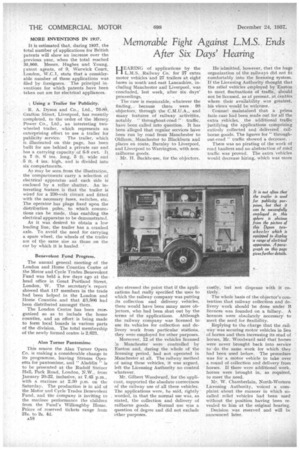Memorable Fight Against L.M.S. Ends
Page 6

If you've noticed an error in this article please click here to report it so we can fix it.
After Six Days' Hearing
HEARING of applications by the L.M.S. Railway Co. for 27 extra motor vehicles and 27 trailers at eight bases in south and east Lancashire, .ineluding Manchester and Liverpool, was concluded, last week, after six days' proceedings.
The case is memorable, whatever the finding,., because there were 98 objectors, through the C.M.1U.A., and many features of railway activities, notably " throughout-road " traffic, have been called into question. It has been alleged that regular services have been run by road from Manchester to Oldham,. Manchester to Blackburn and places en route, Burnley to Liverpool, and Liverpool to Warrington, with nonrailborne goods.
. Mr. H. Backtmuse, for the objectors, also stressed the point that if the applications had really specified the uses to which the railway company was putting Its collection and delivery vehicles, there would have been many more objectors, who had been shut out by the terms of the applications. Although the railway company was licensed to use its vehicles for collection and delivery work from particular stations, they were employed for other purposes.
Moreover, 12 of the vehicles licensed in Manchester were controlled by Euston and, during the whole of the licensing period, had Rot operated in Manchester at all. The railway method of using these vehicles, it was argued, left the Licensing Authority no control whatever.
Mr. Gilbert Woodward, for the applicant, supported the absolute correctness of the railway use of all these vehicles. The applications were, he said, rightly worded, in that the normal use was, as stated, the collection and delivery of
railborne goods. Normal use was a question of degree and did not exclude other purposes. He admitted, however, that the huge organization of the railways did not fit comfortably into the licensing system. If the Licensing Authority thought that the relief vehieleS employed by' Euston to meet fluctuations of traffic, should not be licensed, as at pretent.at Centres where their availability was greatest, his views would be welcome.
Counsel . maintained that a prima facie case had been made out for all the extra Vehicles, the . additional traffic justifying the applications comprising entirely collected and delivered . railborne goods. The figures for " throughout-road " traffic showed a decrease.
There was no pirating Of the work of road hauliers and no abstraction of road traffic was proved. The extra vehicles would, decrease hiring, which was more costly, but not dispense with it .entirely.
The whole basis of the objector's Contention that railway collection and delivery work should be done under B licences was founded on a fallacy.. A licences were absolutely necessary to meet the need for flexibility.
Replying to the charge that the railway was securing motor vehicles in lieu of horses and then increasing its stud of horses, Mr. Woodward said that horses were never brought back into servide to do the same work for which they had beer, used before. The procedure was for a motor vehicle to take over a round of collection and delivery from horses. If there were additional work, horses were brought in, as required, to meet the need.
Mr. W. Chamberlain, North-Western Licensing Authority, voiced a corn, plaint about the manner in which socalled relief vehicles had been used without the position having been revealed to him at the original hearing.
Decision was reserved and will be announced later.


























